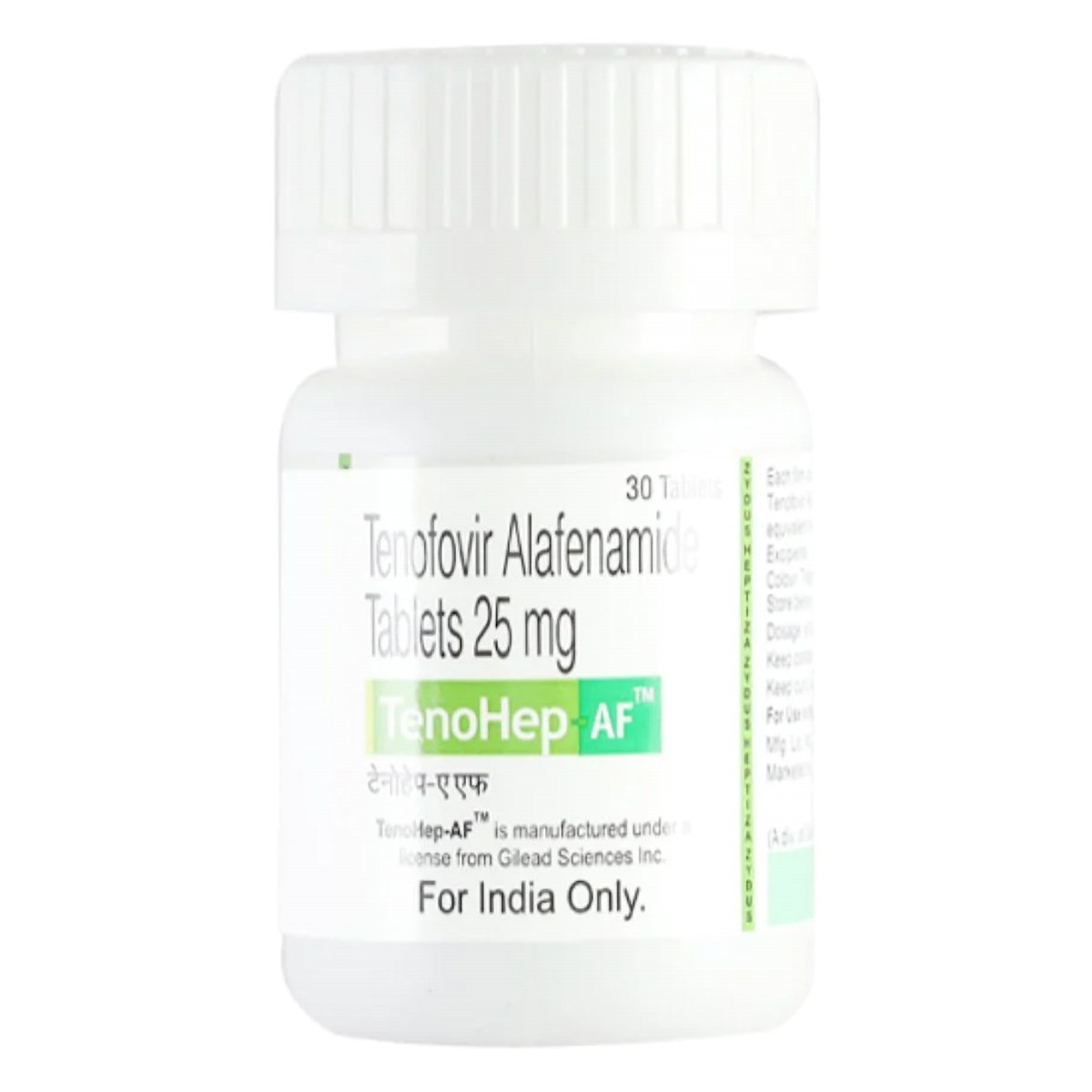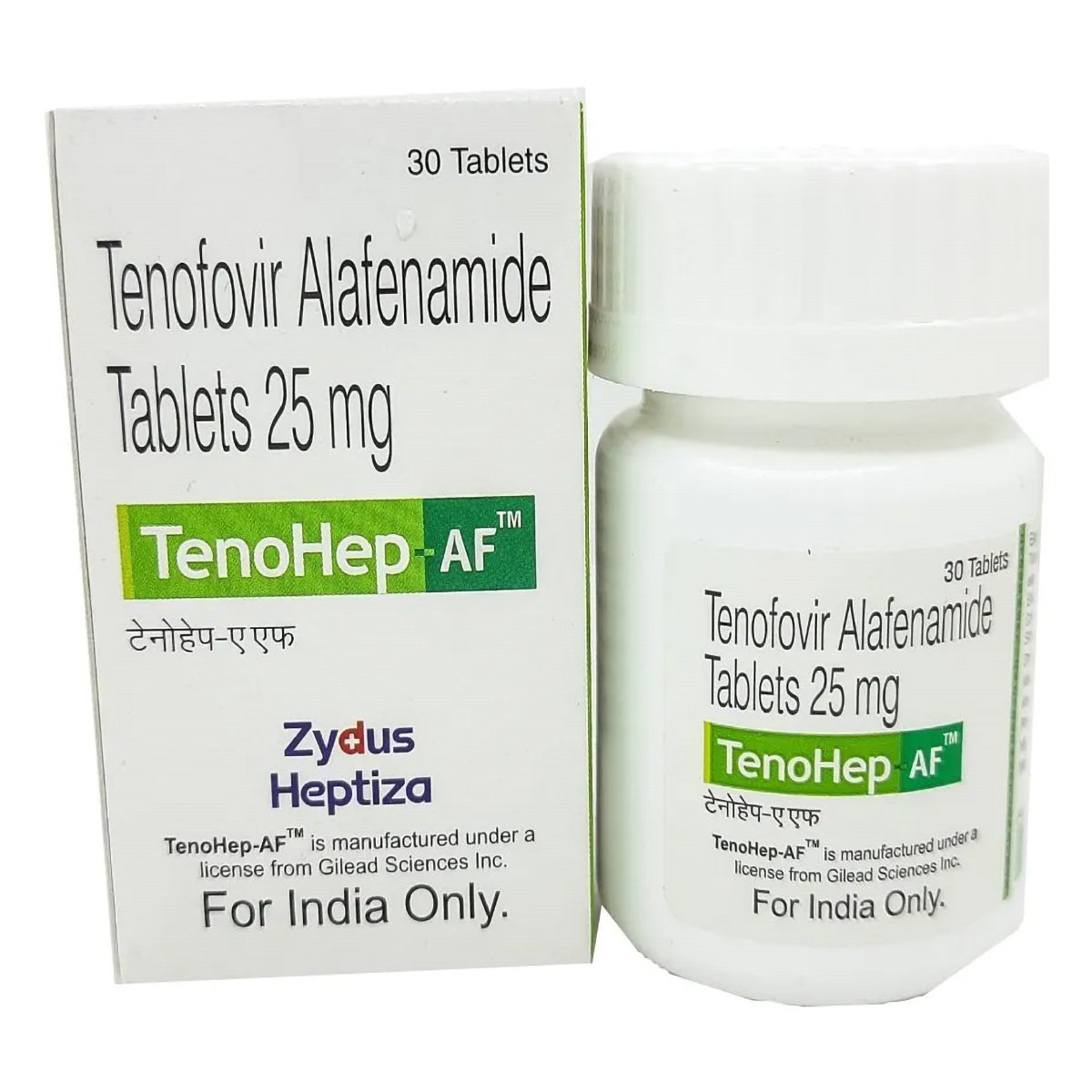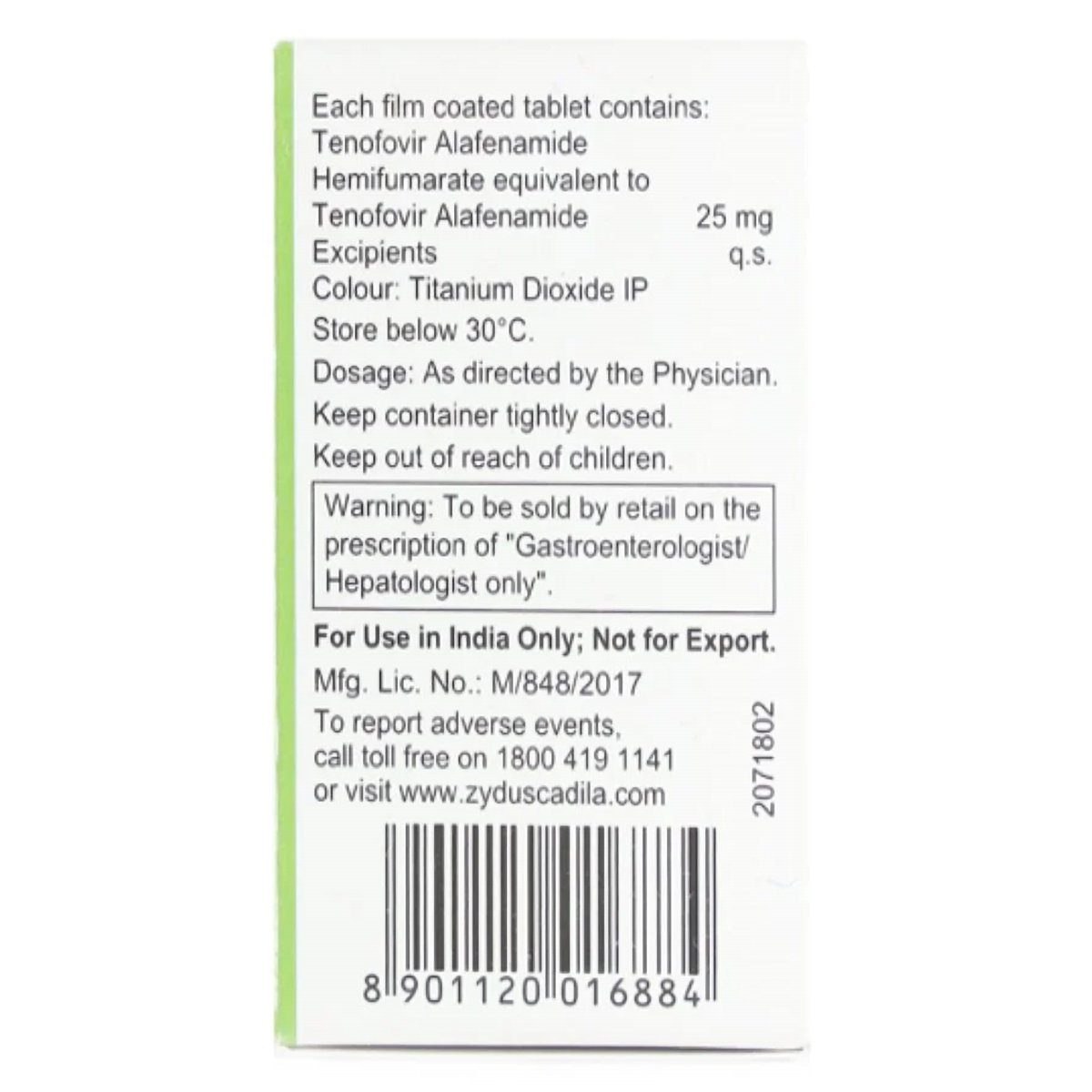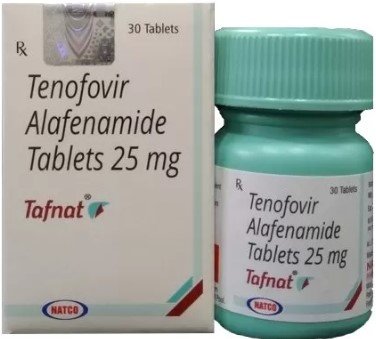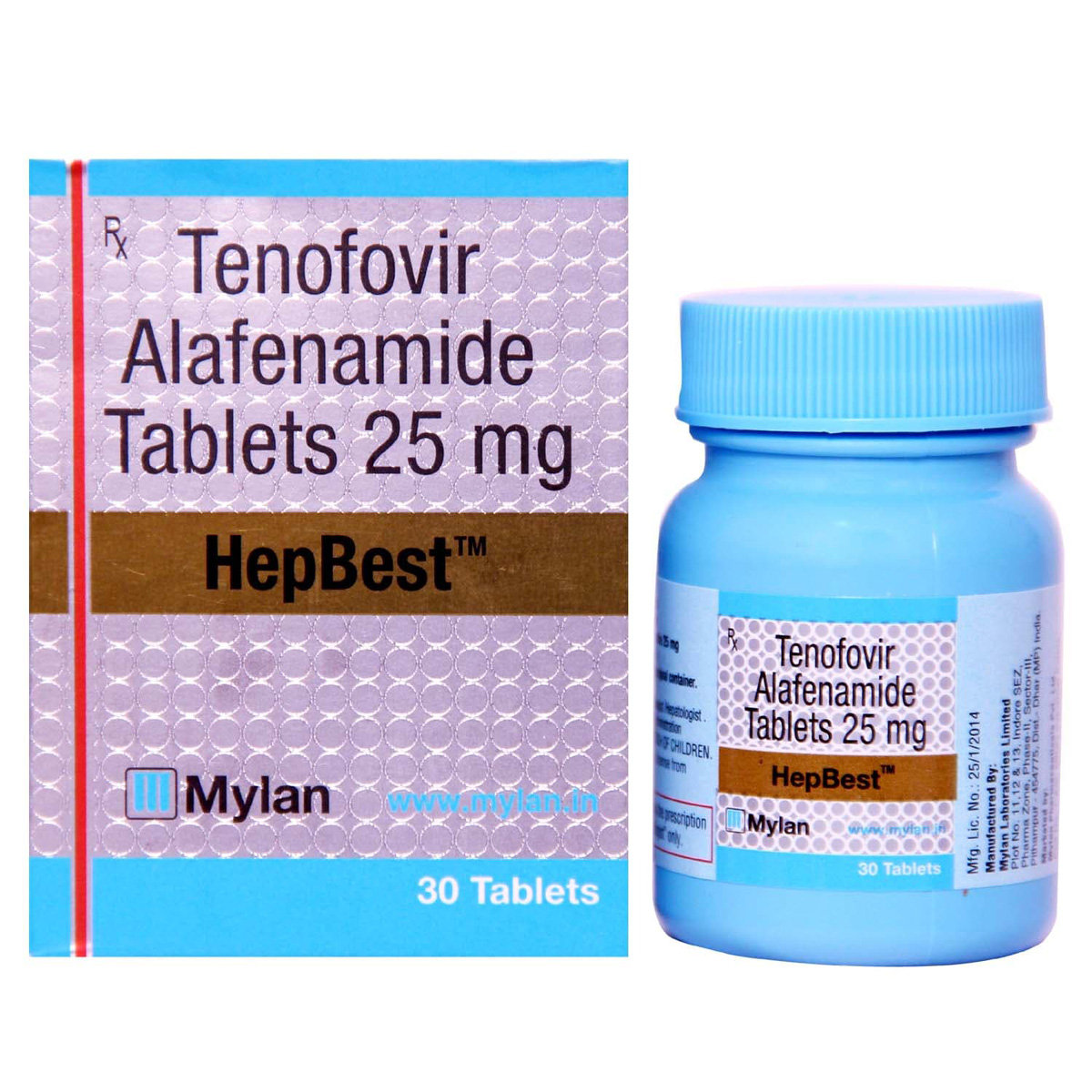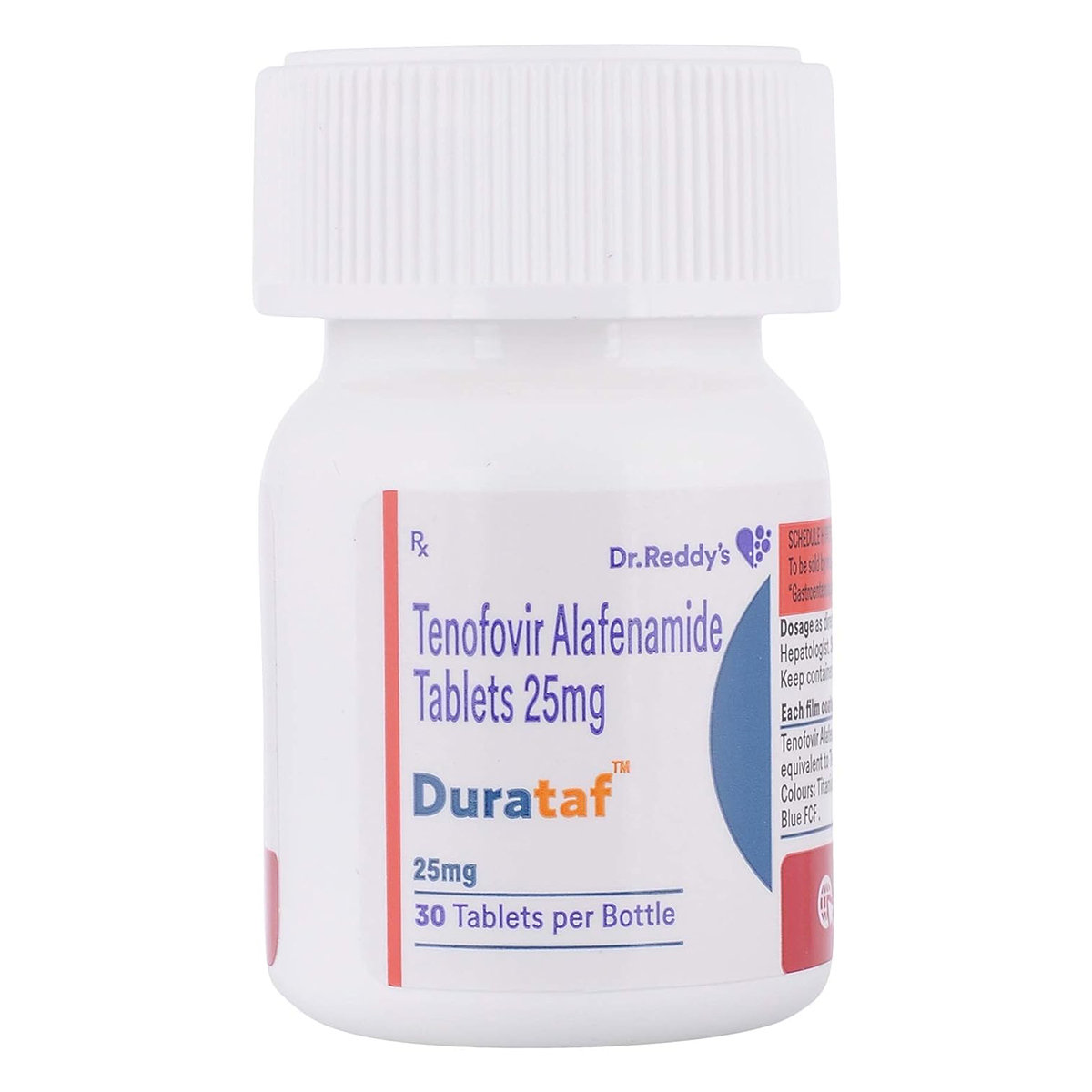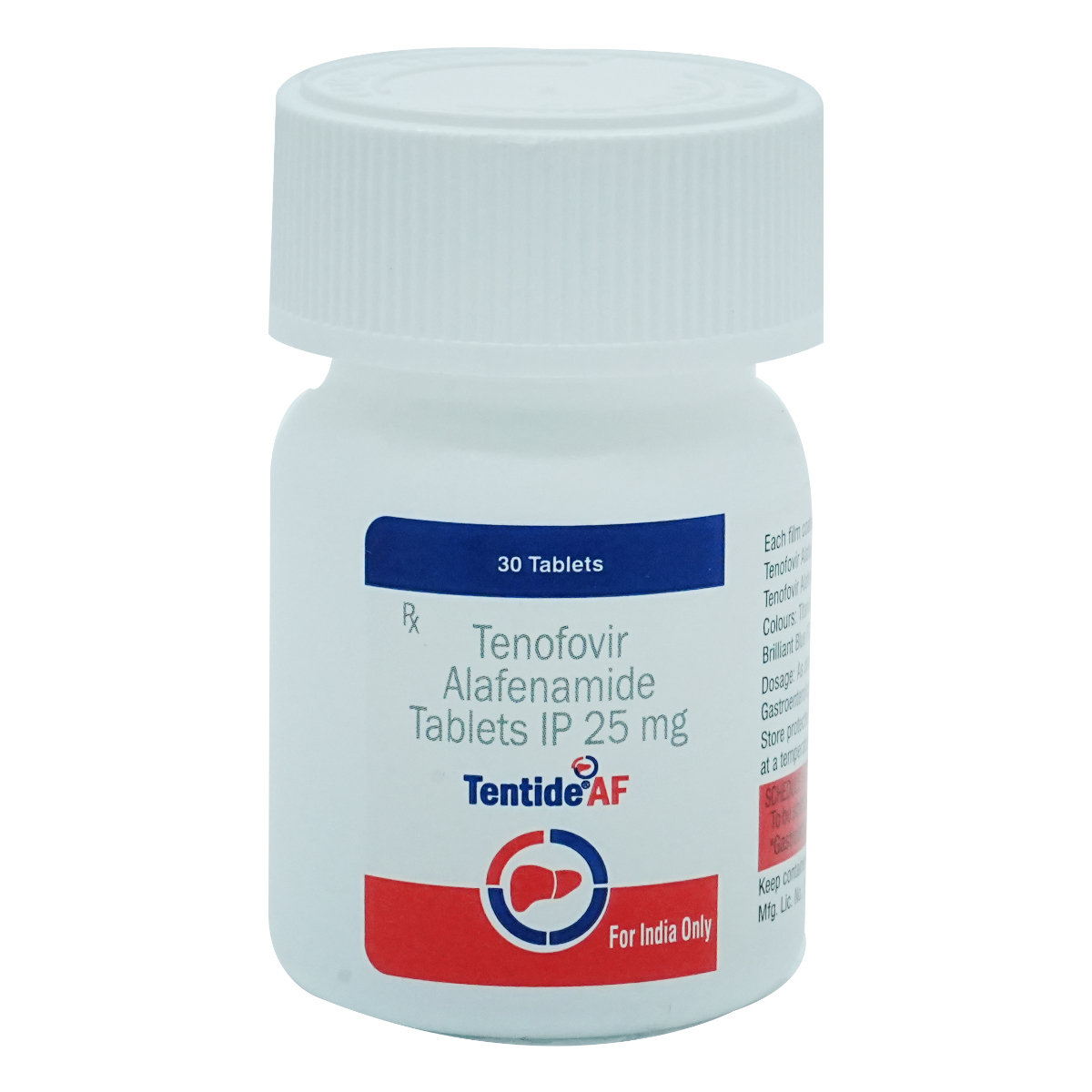Tenohep-AF Tablet 30's
MRP ₹1566
(Inclusive of all Taxes)
₹234.9 Cashback (15%)
Provide Delivery Location
Online payment accepted
 Prescription drug
Prescription drugWhats That
Composition :
Manufacturer/Marketer :
Consume Type :
Expires on or after :
Return Policy :
NPPA :
About Tenohep-AF Tablet
Tenohep-AF Tablet belongs to the group of medicines known as ‘antiviral medicines used to treat chronic hepatitis B virus (HBV) infection in adults with compensated liver disease. Chronic hepatitis B is a long-term viral infection caused by the hepatitis B virus.
Tenohep-AF Tablet contains ‘Tenofovir alafenamide’. It inhibits HBV replication by incorporating the HBV reverse transcriptase into viral DNA, resulting in DNA chain termination. Thereby, it prevents the virus from producing new viruses and clears the infection.
Take Tenohep-AF Tablet as prescribed by your doctor. Therapy should be initiated by a physician experienced in managing chronic hepatitis B. You may sometimes experience headaches, diarrhoea, vomiting, feeling sick (nausea), and rash. Most of these side effects of Tenohep-AF Tablet do not require medical attention and gradually resolve over time. However, if the side effects persist or worsen, please consult your doctor.
You should not take Tenohep-AF Tablet if you are allergic to Tenohep-AF Tablet or any other contents present in it. Avoid taking Tenohep-AF Tablet if you have or had a history of severe kidney or liver impairment. Inform your doctor if you are pregnant, planning to become pregnant, and breastfeeding. Avoid drinking alcohol as it may increase the risk of side effects. You are recommended to avoid driving while using Tenohep-AF Tablet as it may cause dizziness, affecting your ability to drive or use machines. Should not use Tenohep-AF Tablet for children less than 12 years of age. Patients should take necessary precautions to avoid infecting others.
Uses of Tenohep-AF Tablet
Directions for Use
Key Benefits
Tenohep-AF Tablet ‘tenofovir alafenamide’, an antiviral drug used to treat hepatitis B virus (HBV) infection in adults with compensated liver disease. It inhibits HBV replication by incorporating the HBV reverse transcriptase into viral DNA, resulting in DNA chain termination. Thereby it prevents the virus from producing new viruses and cleans up your infection.
Storage
- Rest well; get enough sleep.
- Eat a balanced diet and drink enough water.
- Manage stress with yoga and meditation.
- Limit alcohol and caffeine.
- Physical activities like walking or jogging might help boost energy and make you feel less tired.
- Prepare for a restful night's sleep: Develop a calming pre-sleep routine, like reading or meditation, to help your body relax and prepare for sleep.
- Create a sleep-conducive Environment: Make bedroom a sleep haven by ensuring it is quiet, dark and calm.
- Follow a Sleep Schedule: Go to bed and get up at the same time every day to help regulate your body's internal clock and increase sleep quality.
- Try relaxing techniques like deep breathing, mindfulness meditation and any others.
- Limit stimulating activities before bedtime: Avoid stimulating activities before bedtime to improve sleep quality.
- Monitor Progress: Keep track of your sleep patterns to identify areas for improvement.
- Consult a doctor if needed: If these steps don't improve your sleep, consult a doctor for further guidance and therapy.
- Remember, managing depression as a side effect of medication requires patience, persistence, and collaboration with your healthcare team.
- Tell your doctor about your depression symptoms to adjust medication.
- Consult a therapist or counsel for emotional support.
- Engage in regular exercise to release endorphins (neurotransmitters).
- Practice stress-reducing techniques like meditation and deep breathing.
- Build a support network of friends, family, and support groups.
- Establish a consistent sleep schedule.
- Eat a nutritious diet rich in fruits, vegetables, and whole grains.
- Limit or avoid alcohol and recreational substances.
- Keep a mood journal to track symptoms and progress.
- Hydrate your body: Drink enough water to prevent dehydration and headaches.
- Calm Your Mind: Deep breathing and meditation can help you relax and relieve stress.
- Rest and Recharge: Sleep for 7-8 hours to reduce headache triggers.
- Take rest: lie down in a quiet, dark environment.
- Cold or warm compresses can help reduce tension.
- Stay Upright: Maintain good posture to keep symptoms from getting worse.
- To treat headaches naturally, try acupuncture or massage therapy.
- Over-the-counter pain relievers include acetaminophen and ibuprofen.
- Prescription Assistance: Speak with your doctor about more substantial drug alternatives.
- Severe Headaches: Seek emergency medical assistance for sudden, severe headaches.
- Frequent Headaches: If you get reoccurring headaches, consult your doctor.
- Headaches with Symptoms: Seek medical attention if your headaches include fever, disorientation, or weakness.
- Drink water or other clear fluids.
- To prevent worsening of pain, limit intake of tea, coffee, or alcohol.
- Include bland foods like rice, toast, crackers, and rice in your diet.
- Avoid lying down immediately after eating as it may cause indigestion or heartburn.
- Avoid acidic and spicy food as it may cause indigestion.
- Inform your doctor about the nausea and discuss possible alternatives to the medication or adjustments to the dosage.
- Divide your daily food intake into smaller, more frequent meals to reduce nausea.
- Opt for bland, easily digestible foods like crackers, toast, plain rice, bananas, and applesauce.
- Avoid certain foods that can trigger nausea, such as fatty, greasy, spicy, and smelly foods.
- Drink plenty of fluids, such as water, clear broth, or electrolyte-rich beverages like coconut water or sports drinks.
- Use ginger (tea, ale, or candies) to help relieve nausea.
- Get adequate rest and also avoid strenuous activities that can worsen nausea.
- Talk to your doctor about taking anti-nausea medication if your nausea is severe.
- Record when your nausea occurs, what triggers it, and what provides relief to help you identify patterns and manage your symptoms more effectively.
- Inform Your Doctor: Notify your doctor immediately about your diarrhoea symptoms. This allows them to adjust your medication or provide guidance on managing side effects.
- Stay Hydrated: Drink plenty of fluids to replace lost water and electrolytes. Choose water, clear broth, and electrolyte-rich drinks. Avoid carbonated or caffeinated beverages to effectively rehydrate your body.
- Follow a Bland Diet: Eat easy-to-digest foods to help firm up your stool and settle your stomach. Try incorporating bananas, rice, applesauce, toast, plain crackers, and boiled vegetables into your diet.
- Avoid Trigger Foods: Steer clear of foods that can worsen diarrhoea, such as spicy, fatty, or greasy foods, high-fibre foods, and dairy products (especially if you're lactose intolerant).
- Practice Good Hygiene: Maintain good hygiene to prevent the spread of infection. To stay healthy, wash your hands frequently, clean and disinfect surfaces regularly, and avoid exchanging personal belongings with others.
- Take Anti-Diarrheal Medications: If your doctor advises, anti-diarrheal medications such as loperamide might help manage diarrhoea symptoms. Always follow your doctor's directions.
- Keep track of your diarrhoea symptoms. If they don't get better or worse or are accompanied by severe stomach pain, blood, or dehydration signs (like extreme thirst or dark urine), seek medical help.
Drug Warnings
You should not take Tenohep-AF Tablet if you are allergic to Tenohep-AF Tablet or any other contents present in it. Avoid taking Tenohep-AF Tablet if you have or had a history of severe kidney or liver impairment. Inform your doctor if you are pregnant, planning to become pregnant, and breastfeeding. Avoid drinking alcohol as it may increase the risk of side effects. You should not drive while using Tenohep-AF Tablet as Tenohep-AF Tablet may cause dizziness, affecting your ability to drive or use machines. Tenohep-AF Tablet is not recommended for children less than 12 years of age. Patients should take necessary precautions to avoid infecting others.
Drug-Drug Interactions
Drug-Drug Interactions
Login/Sign Up
Coadministration of Cidofovir and Tenohep-AF Tablet can increase the risk of kidney problems.
How to manage the interaction:
Taking Cidofovir and Tenohep-AF Tablet together is not recommended as it can lead to an interaction, it can be taken if advised by your doctor. However, if you experience any symptoms like nausea, vomiting, loss of hunger, increased or decreased urination, sudden weight gain or weight loss, fluid retention, swelling, shortness of breath, bone pain, muscle cramps, tiredness, weakness, dizziness, confusion, and irregular heart rhythm, contact your doctor immediately. Do not discontinue any medications without first consulting your doctor.
Co-administration of Tenohep-AF Tablet with valacyclovir may increase the risk of kidney problems.
How to manage the interaction:
Although taking Tenohep-AF Tablet and valacyclovir together can possibly result in an interaction, it can be taken if your doctor has prescribed it. However, consult the doctor immediately if you experience symptoms such as nausea, vomiting, loss of appetite, increased urination, weight loss, swelling, shortness of breath, muscle cramps, tiredness, weakness, dizziness, confusion, and irregular heart rhythm. Do not stop using any medications without consulting a doctor.
The combined use of Ifosfamide and Tenohep-AF Tablet can increase the risk of kidney problems.
How to manage the interaction:
Taking Ifosfamide and Tenohep-AF Tablet together can lead to an interaction, it can be taken if advised by your doctor. However, if you experience any symptoms like nausea, vomiting, loss of appetite, increased or decreased urination, sudden weight gain or weight loss, fluid retention, swelling, shortness of breath, bone pain, muscle cramps, tiredness, weakness, dizziness, confusion, and irregular heart rhythm, contact your doctor immediately. Do not discontinue any medications without consulting your doctor.
Taking Tenohep-AF Tablet with Polymyxin B can increase the chance of side effects.
How to manage the interaction:
Taking Tenohep-AF Tablet with Polymyxin b together can result in an interaction, but it can be taken if a doctor has advised it. However, if you experience nausea, vomiting, a decrease in hunger, increased or decreased urine, weight gain or loss that occurs suddenly, fluid retention, swelling, difficulty breathing, bone pain, muscle pain, fatigue, weakness, dizziness, confusion, and irregular heartbeat, consult a doctor. Do not discontinue any medications without a doctor's advice.
Co-administration of Tenohep-AF Tablet with Mesalazine may increase the risk of kidney problems.
How to manage the interaction:
There is a possibility of interaction between Mesalazine with Tenohep-AF Tablet, but they can be taken together if a doctor has prescribed them. Consult a doctor immediately if you experience increased or decreased urination, swelling, shortness of breath, bone pain, cramping in the muscles. Do not discontinue the medication without consulting a doctor.
When Valganciclovir is taken with Tenohep-AF Tablet it may increase the risk of kidney problems.
How to manage the interaction:
Although taking Tenohep-AF Tablet and Valganciclovir together can cause an interaction, it can be taken if your doctor has suggested it. However, consult your doctor immediately if you experience symptoms such as nausea, vomiting, loss of appetite, increased or decreased urination, sudden weight gain or weight loss, fluid retention, swelling, shortness of breath, bone pain, muscle cramps, tiredness, weakness, dizziness, confusion, and irregular heart rhythm. Do not stop using any medications without talking to your doctor.
Tenofovir may cause kidney problems and combining it with deferasirox may increase that risk.
How to manage the interaction:
Although taking tenofovir and Deferasirox together can possibly result in an interaction, it can be taken if your doctor has prescribed it. However, if you experience nausea, vomiting, loss of appetite, increased or decreased urination, fluid retention, swelling, shortness of breath, bone pain, muscle cramps, tiredness, weakness, dizziness, confusion, or irregular heart rhythm, seek immediate medical attention. Drink plenty of water if you experience diarrhoea or vomiting while taking these medications, as dehydration can potentially affect the kidneys. Do not discontinue any medications without a doctor's advice.
The combined use of Cisplatin and Tenohep-AF Tablet can increase the risk of kidney problems.
How to manage the interaction:
Taking Cisplatin and Tenohep-AF Tablet together can lead to an interaction, it can be taken if advised by your doctor. However, if you experience any symptoms like nausea, vomiting, loss of appetite, increased or decreased urination, sudden weight gain or weight loss, fluid retention, swelling, shortness of breath, bone pain, muscle cramps, tiredness, weakness, dizziness, confusion, and irregular heart rhythm, contact your doctor immediately. Do not discontinue any medications without first consulting your doctor.
Taking Tenohep-AF Tablet with tobramycin can increase the risk of kidney problems.
How to manage the interaction:
Although taking Tenohep-AF Tablet and Tobramycin together can evidently cause an interaction, it can be taken if your doctor has suggested it. However, if you experience nausea, vomiting, loss of appetite, increased or decreased urination, sudden weight gain or weight loss, fluid retention, swelling, shortness of breath, bone pain, muscle cramps, tiredness, weakness, dizziness, confusion, and irregular heart rhythm contact your doctor immediately. Do not stop using any medications without a doctor's advice.
Co-administration of Meloxicam with Tenohep-AF Tablet together can increase the risk or severity of kidney problems.
How to manage the interaction:
Taking Meloxicam with Tenohep-AF Tablet together can possibly result in an interaction, but it can be taken if a doctor has advised it. If you have any of these symptoms - feeling sick, gaining or losing weight suddenly, holding onto fluids, swelling, trouble breathing, bone or muscle pain, feeling weak or dizzy, feeling confused, or having an irregular heartbeat - contact a doctor right away. Do not discontinue any medications without consulting a doctor.
Drug-Food Interactions
Drug-Food Interactions
Login/Sign Up
Diet & Lifestyle Advise
- Eat a diet that includes fresh fruits and vegetables.
- Opt for lean meat such as skinless chicken and fish.
- Limit processed and high-sugar foods.
- Avoid acidic foods such as tomatoes, lemons, and oranges.
- Limit alcohol intake and quit smoking.
- Exercise regularly as it promotes both physical and mental health.
- Take the necessary precautions to avoid the spread of infection to other people.
Side Effects of Tenohep-AF Tablet
- Diarrhoea
- Vomiting
- Feeling sick (nausea)
- Dizziness
- Stomach pain
- Joint pain
- Feeling bloated
- Wind (flatulence)
- Feeling tired
Habit Forming
Therapeutic Class
All Substitutes & Brand Comparisons
RX
Tafnat 25 Tablet 30's
Natco Pharma Ltd
₹1371.5
(₹40.23 per unit)
14% CHEAPERRX
Out of StockTafbest Tablet
₹1355
(₹40.65 per unit)
13% CHEAPERRX
TENVIR AF 25MG TABLET 30'S
Cipla Ltd
₹1397
(₹41.91 per unit)
10% CHEAPER
Author Details
We provide you with authentic, trustworthy and relevant information
Drug-Diseases Interactions
Drug-Diseases Interactions
Login/Sign Up
FAQs
Drug-Drug Interactions Checker List
- TOBRAMYCIN
- PENTAMIDINE
- VANCOMYCIN
- AMPHOTERICIN B
- FOSCARNET
- GANCICLOVIR
- ADEFOVIR
- IBUPROFEN
Special Advise
- If you take Tenohep-AF Tablet , your doctor may regularly monitor liver function, kidney function, and bone density.
Disease/Condition Glossary
Hepatitis B: Hepatitis B is a potentially fatal liver infection caused by the hepatitis B virus (HBV). It is highly contagious (spreads from one person to another) and spreads by intimate contact with an infected individual, direct contact with infected blood, use of a contaminated needle, use of an infected razor/other personal objects, or transmission from mother to baby during birth. The virus can survive outside the body for up to 7 days. Chronic hepatitis B develops slowly, and symptoms may not be obvious until complications arise. Hepatitis B symptoms might occur three months after being exposed to the infection and can continue for two to twelve weeks. Chronic hepatitis B consequences include liver failure, liver cancer, and liver cirrhosis (scarring). Hepatitis B can be prevented by taking the vaccination.

Have a query?
Alcohol
Safe if prescribed
Avoid drinking alcohol. Consuming alcohol while using Tenohep-AF Tablet may worsen the condition.
Pregnancy
Consult your doctor
Tenohep-AF Tablet is not recommended during pregnancy. However, your doctor may prescribe it for you during pregnancy if he/she feels that the benefit to you outweighs the risk. You should not take Tenohep-AF Tablet without the doctor's advice.
Breast Feeding
Consult your doctor
Consult your doctor, and there is no substantial research yet on the use of Tenohep-AF Tablet in breastfeeding/nursing mothers.
Driving
Safe if prescribed
Tenohep-AF Tablet can cause dizziness. If you feel dizzy when taking Tenohep-AF Tablet , do not drive and use any tools or machines.
Liver
Consult your doctor
Consult your doctor before taking Tenohep-AF Tablet if you have a liver impairment or any concerns regarding this. Your doctor will weigh the benefits and any potential risks before prescribing them to you.
Kidney
Consult your doctor
Consult your doctor before taking Tenohep-AF Tablet if you have kidney impairment or any concerns regarding this. Your doctor will weigh the benefits and any potential risks before prescribing them to you.
Children
Safe if prescribed
Should not use Tenohep-AF Tablet in children below 12 years of age.

